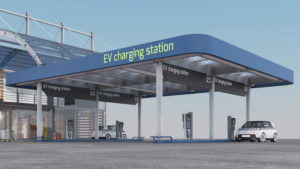
By arsa35 @ Shutterstock.com
Automakers are currently racing to fix one of the most significant problems with electric vehicles, charging times. Ultra fast chargers are available that could add 215 miles of range to a battery in 10 minutes, if today’s batteries could handle it. Unfortunately they cannot, and so automakers are looking for solutions. Bloomberg’s David Stringer reports:
A typical, slow-speed public EV charger offers about 20 miles of driving distance per hour at the plug. The next level up, called a fast charger, can add about 75 miles in 30 minutes, according to Los Angeles-based station operator EVgo Services LLC.
The ultra-fast chargers blow those away.
Tritium, formed in 2001 by members of a solar-car racing team, makes pumps that add more than 215 miles of range in 10 minutes. Customers include Ionity GmbH — a consortium of carmakers, including Volkswagen and Ford, that’s partnering with energy giants such as Royal Dutch Shell Plcand Kuwait Petroleum International.
Ionity is building about 400 stations — with as many as six ultra-fast chargers each –- on European highways to compete with networks backed by Renault SA and Nissan Motor Co. ABB, with chargers deployed in 70 countries, is also supplying high-speed pumps. It’s “a real breakthrough in terms of convenience,’’ CEO Ulrich Spiesshofer told the CERAWeek conference in Houston in March. “We barbecued a couple of cars until we got there.’’
Electrify America, a Volkswagen unit created under a settlement in the automaker’s emissions scandal, is spending $2 billion on refueling stations in the U.S. over a decade, installing its first ultra-fast charger in Chicopee, Massachusetts, last May.
“The charging capacities of electric vehicles have doubled in the space of a few years,’’ Wolfsburg, Germany-based Volkswagen said in an email. “We expect that fast-charging in public spaces will become the norm.’
Tesla, which has more than 12,000 chargers globally, is boosting the speed of its own refueling units to cut time at the pump by as much as half. The upgrade promises to add as much as 75 miles of charge in five minutes — still lagging the ultra-fast models.
The speed at which current EVs can recharge is limited by such factors as the size of their battery, the voltage the pack can accept and the charger’s current.
While it may be years before battery packs able to handle the power surge from ultra-fast chargers go mainstream, some new EVs — including Hyundai Motor Co.’s Kona Electric and Jaguar Land Rover Automotive Plc’s I-Pace — already can recharge faster than previous generations.
Read more here.
